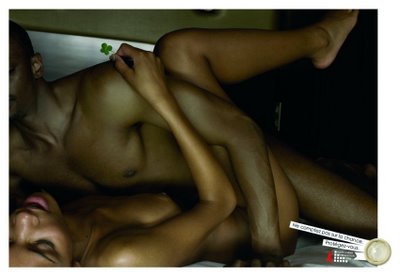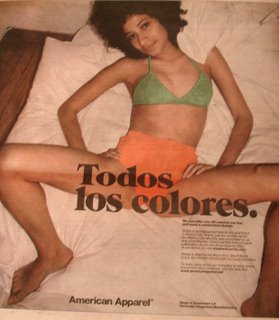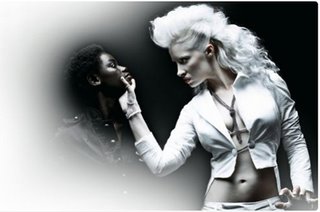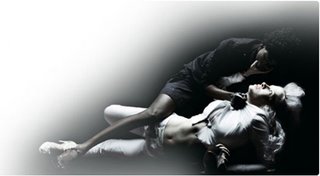Thursday, August 31, 2006
María Sharapova feels pretty.
I saw this spot on TV the other night, and was immediately swept up in the song... it's hard not to be. It's fun, it's peppy, and ultimately, it shows girls can be a hell of a lot more than just pretty.
"I'm excited about this ad because not only is Nike drawing attention to women's tennis, but there's also an empowering message for female athletes that it's okay to be fierce and competitive on the court and still have a feminine side off court," said Sharapova. (from CNN Money)
On the other side, however, as David from Thirdway points out, "Sharapova was hired as a spokesperson by Nike not just because she is one of the top female tennis players, but because she is very attractive. So while she works unique well for this campaign, there are still lots of other players who will never have this chance because of the societal values that Nike is taking aim at in this spot." Hmmmm.
Client: Nike
Agency: Wieden + Kennedy, Portland, Ore.
Tuesday, August 29, 2006
Sex Positive, Anti-AIDS Messages



Sex positive, gender positive, and race positive. Simple visuals, simple (but important!) message. Sometimes simple is best- no clutter. I like the subtle visuals & symbolism. (Translation of copy: "Don't count on luck. Protect yourself.")
Found on Coolz0r.
Client: Plate-Forme Prévention SIDA
Agency: Euro RSCG Life
Kellogg's Special K: Spec Work

This is pretty damn clever. Steve at Adrants wrote about it today, and while it appears to be spec work, I still think it's great.
The girl isn't morbidly thin, Special K is supposed to be a healthy cereal for women; it gets all those points across in a charming and witty way.
(And if you don't get the phone number, it's ok, it's because it's not an American number. It's European listing.)
Tuesday, August 22, 2006
Secret gets you to spill it....
 Secret just launched a campaign for their anniversary, asking women consumers to “share their secret.” The television and web spots are directed by Jessica Yu (she’s done documentary work in the past, and has also worked on Grey’s Anatomy, American Dreams, and ER). “Real” people were used for the spots, not actors—so, supposedly, real secrets were filmed: “There’s better stuff between real people—things that you can’t imagine,” says Yu.
Secret just launched a campaign for their anniversary, asking women consumers to “share their secret.” The television and web spots are directed by Jessica Yu (she’s done documentary work in the past, and has also worked on Grey’s Anatomy, American Dreams, and ER). “Real” people were used for the spots, not actors—so, supposedly, real secrets were filmed: “There’s better stuff between real people—things that you can’t imagine,” says Yu. Link to one of the spots “I told” on this week’s Ad Age. (Link will probably die after this week’s over, so check out the other spots on Secret’s site.) This spot is an affirmation of sisterhood: “one young woman admits to her sister that she told their parents about the sister's first sex encounter.” So much for that being a secret…
With the television ads, there is a tie-in project with print ads featuring text messaged secrets from women around the country. They’re visible in various subways stations within NYC, and I’m sure elsewhere.
Many of the supposed secrets that were shared seem of the garden variety, insecure type:
“I want a fairytale relationship.”
“I wish he still loved me.”
“I’m still in love with my ex even though he dumped me.”
“I think I’m staying for security.”
And while these are moments of weakness, I can see how they’re true secrets—things we hide within ourselves, because we want to be strong, want to be independent, want to be unique and clever and awesome. Just as these “girly” or “feminine” weaker secrets are shared, there are also secrets shared that have nothing to do with gender roles or sex,
“I never finished collage.”
“I’m afraid to be alone.”
“I talk out loud to no one.”
“Growing up scares me.”
“I have a hard time keeping my lies straight.”
Stunningly few are amazingly affirmative and wonderful:
“I’m more secure with myself than I’ve ever been in my life.”
"My sister is my hero.”
So, I’m thinking about Secret as a brand, and how this campaign seems to want to celebrate strong and independent women. Sort of similar to Dove in some ways. The commercials themselves are quirky, sort of positive, and pro-female: “Dad took me to get a tattoo” is an example of one of those confessions.
We don’t see things like “I still love him even though he’s married,” even though, unfortunately, that seems to be the majority of the user submissions.
Secret had an interesting idea, but it seems the users didn’t quite measure up. They’re submitting their secrets, their truths, but when all you see is their secret fears; it’s hard to remember the hopes and dreams that balance it all out. I’m surprised by the amount of pain and heart-ache within these text submissions. When all we’re judging is a quick sentence, it’s hard to tell if these women are strong through out the rest of their lives, and this is their one admission of weakness, of fallibility, and of true humanity.
Secret can’t control what sort of submissions they receive, but I’m not sure if this was entirely what they were expecting. It’s hard to run a campaign about the wonders of girl-power when your source material is a bit weak. Why is that? I think it’s because when we think about the nature of what a secret is, it’s something we don’t want to share with others. Positive news, for that reason, would very rarely be a secret—we want to shout our successes from the rooftops, but not our miseries and failures. So, chances are, these women aren’t weak and crying—they’re just sharing actual secrets, private parts of themselves that not everyone gets to see. And that, I think, makes them strong.
Agency: Leo Burnett, Chicago.
Thursday, August 17, 2006
You're selling clothes, not skin.
 You ever hear stories about the girl who poses nude or semi-nude for her boyfriend, then the photos get spread around without her permission? The American Apparel ads are particularly irksome to me because of their similarities. There's no gloss, no barrier, just women posing in an intimate way, as if for a lover. They're too raw. As it turns out, I'm not the only one bothered by these over-sexed ads and graphics:
You ever hear stories about the girl who poses nude or semi-nude for her boyfriend, then the photos get spread around without her permission? The American Apparel ads are particularly irksome to me because of their similarities. There's no gloss, no barrier, just women posing in an intimate way, as if for a lover. They're too raw. As it turns out, I'm not the only one bothered by these over-sexed ads and graphics:There's a brilliant article in this week's Business Week attacking advertising tactics by American Apparel & Abercrombie. Turns out that Business Week has a weekly column called Girl Improved, written by the women at 3iYing (which seems to be a market research company focused on female consumers).
"Girls cringe at overtly sexual ads, yet paradoxically, marketing campaigns targeted at teen girls are sex-obsessed," the article states, and goes on to detail how women fashions are aimed at men; trying to impress them and attempting to fulfill male fantasy, not young women's ideals.
The authors later go on to point out that often the message is confused due to the overuse of sex: "Gratuitous sex dilutes the sales value of your expensive advertisements... By relying on sex to sell your product you are not only getting lost in the steamy sea of marketing erotica, you're not highlighting what you want us to love in the first place—your product."
Kudos-- I'm glad that some people are realizing that women are consumers in their own right, and the same old ad ideas won't work on them. Let's class it up. I'm tired of walking into a store and seeing images like these.* Just a sidebar: American Apparel seems to have run into multiple issues regarding sex and gender, including harrassment charges against its CEO. Read about it here and here. And also, here. Or just google it.
Post Mortem: That Girl Emily
Anyhow- as predicted, the That Girl Emily blog was indeed a viral marketing technique-- I saw the billboard in the cab the other day (I see so much in cabs.). It's been updated, and now features a huge poster for a Court TV show. Eww.
Wish I could find a photo- nothing yet.
I'm surprised a viral technique was used to promote the P.I. show-- the blog made me more interested in the psycho wife Emily, not the P.I. who might be helping her. It was a terrific use of blogs, YouTube, traditional outdoor ad placement, etc, but the product doesn't measure up to the hype. Another good question might be how much will this stunt may hurt the Court TV brand: I would normally associate justice and law enforcement shows with the truth-- not a shady marketing scheme.
Boards Women of Excellence Announced
Speaking of Vonk, here's a great link to a post & discussion she started about the whole Neil French episode (originally written about on TS here).
PSP's Racially & Sexually Charged Ads


Lots of people have already noted how racially charged these print ads have been for the portable Sony PSP-- but few have pointed out how strongly they objectify the women within them. The ads, done by TBWA, were eventually pulled.
As you can see, a caucasion women dressed in white dominates a black woman, dressed in black. In the other picture, the reverse happens. It's supposed to show the struggle to pick what color (black or white) is better for your PSP. Instead, it shows women competing as sex objects, wanting to be top bitch. The poses and expressions are also very savage; the women are animals.
The only reason that this ad was pulled was for the racial content-- not the gender issues. I'm not trying to downplay the racial disparities at all, just trying to point out that gender inequality shouldn't be overlooked.
Thursday, August 10, 2006
...you mean I don't?
As soon as I saw it, it got me thinking. I'm a woman. Do I feel like one? What the hell is it supposed to feel like (besides the PMS bullshit). The ad suddenly made me question whether or not I even felt the way I was supposed to... all thanks to a phrase.
It doesn't take an idiot to realize that they're trying to simply sell designer clothes and cosmetics, and want to tap into the modern women's urge to sometimes indulge her feminine side. Still, it was troubling that the wording initial made me question what I'm supposed to feel like.
I did a little research this morning, and came across this little article in New York Magazine. Originally, in 1976, her slogan was "Feel like a woman. Wear a dress." Talk about a backlash against the pantsuits and jeans of the era...
Wednesday, August 09, 2006
Fratire vs. ChickLit
 Fratire? What does this mean for women? Does it mean anything? Or are guys becoming just as packaged and manipulated as women? (Probably. Who these days isn't?)
Fratire? What does this mean for women? Does it mean anything? Or are guys becoming just as packaged and manipulated as women? (Probably. Who these days isn't?)Tucker Max, in his post on the HuffingtonPost, goes on to say/write some things about feminism I'm not entirely sure I agree with, but I do agree that this surge in "masculinity" and the creation of fratire is related to feminism. As he says, the ideas of feminism, and esp. extreme feminism, can't exist in a vaccuum. It affects other people, other ideas, etc.
Something that he said that I also agree with (for the most part) is that Fratire isn't neccessarily against women as a gender. Some of the authors/bloggers might be (as he is himself quite often), but as a movement, it's mostly a celebration of brash masculinity and beer. As he points out, women are a fan of both his site, and Maddox's. (Yeah, I do read the Best Page in the Universe.)
Now, I'm just trying to figure out... why, if both ChickLit and Fratire have fans, and I suppose a respective place on someone's bookshelf, does it make me feel uneasy? I think it's because both genres seem to be rather limiting, and pigeonhole both the readers and the authors quite quickly. The Shopaholic books, or Nanny Diaries, etc, are for a select group of people... they seem like the "pulp classics" of today's world, along with romance novels (ewww).
[EDIT: And, as I grow more familar with Tucker's book & site, it seems he details the exploits his drunken exploits with equally drunk women. Shall we say, a "Girls Gone Wild" for the literaries? Give me humor, give me wit, but please, give me taste and perhaps a shred of respect. Interestingly enough, it seems Tucker (and a few other Fratire writers) seem to realize that they're complete assholes, though they seem to think its part of their appeal. Really though, it just validates and confirms drunken, assinine behavior across college campuses nationwide.]
Just as certain people like Westerns or mysteries, I guess there's a spot for these "new" genres as well. Not on my shelf though.
Does sex sell? Why?
"Noting there are far more ads that feature scantily clad women then scantily clad men, one might argue there's a tremendous unfairness going on. True, perhaps, but all one has to do is take a quick look at that industry that knows more about human nature than any marketer ever will, the porn industry. It's focused almost entirely towards men. Why? Because men want it. Men like it. Men need it. Men are attracted to it. The exact same way men are attracted to sexually laced advertising. The approach doesn't always make a great ad but, all other strategies aside, it is most certainly a powerful motivator."
My response: Sex isn't something we should censor, or ignore or hide. We shouldn't live in a puritan society. But, at the same time, so many people take their cues from advertising, and so much negative imagery is out there, showing thin, writhing women showcasing all sorts of products. It might sell, but surely there is a place for sexy and responsible advertising. What might that look like you ask? I'm not entirely sure, but I think it could exist. Any ideas?
Not to mention, when you cater to all of those slathering guys, you're ignoring half of the consumer market: the women. It's interesting how women are stereotyped as shoppers, but not nearly marketed to like a powerful segment of the consumer world. Women have more money and more independant purchasing power than ever. Show us some sexy guys, we'll buy your product.
Quick Link
Tuesday, August 08, 2006
Remember Keri Russell?
I just heard that she's the new face of CoverGirl. (Yeah, this is older news, but I've been a little out of the loop. CoverGirl, Maybelline, whatever.)
It's interesting (and sad?) to note how strongly women performer's screen presence and resonance seems tied to their physical appearance. A haircut didn't change her acting abilty (at least, I hope not), but it definitely changed how people percieved her. She was pretty talented on Felicity, but her haircut proved more fatal than Samson's.
Anyway, watch the commercial if you want. Her trademark curls are gone, much like her early successes.
* Just a note on the spot itself-- did you notice how the only visible "bad guy" she takes out, besides the shadow-figures, was a black guy? :(
Agency: Grey Worldwide
Friday, August 04, 2006
Don't Die for a Diet
One in a hundred adolescent girls has anorexia (ANRED). With pressure being so high on young women these days, it's surprising you don't see more PSA's targeting this growing problem. However, Houtlust, reports a terrific one sponsored by the EDA, the Eating Disorders Association in Britain (with this tie-in site too).
Eating disorders can kill. While the Internet has made it easier than ever to get help, it's also made it easier to support having a disorder, with "communities" and "support groups" trading tips and pointers on how to hide the illness and lose weight faster-- a sort of twisted Weight Watchers. Even code words are used: Ana, for anorexia, Billy, for bulimia.
Watch the PSA. Eat healthy. Force a burger into Kate Moss's mouth.
Agency: AMV BBDO, Proximity London.
